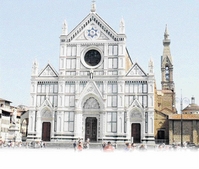Travelling trip-up: Heading to Italy on the road to no where
Published: Saturday | March 7, 2009

The Basilica de Santa Croce, Florence. - Photo by Freddie Pragnell
Florence is the pantheon of Italian glories; every facet of its construction is art. The ancient city of Julius Caesar, Leonardo Da Vinci, Michelangelo, Machiavelli, Galileo and Dante does not suffer under the weight of history. Its buildings are devoted to narratives: either the suffering of Jesus or the pagan narcissism of ancient Italy instruct the architecture of the Duomo or of its transformed Baptistry.
I arrived in Florence with a school friend named Warwick to meet another friend James. The promise of the renaissance city, though, was overshadowed by a looming doubt: we had arrived with money for food and frivolity but none for a place to stay. Warwick and I had been promised a place to stay for our two weeks free of rent and the mental burden it brought with it.
James had promised such a utopia for us but doubt soon swept over us as we went into the city by bus. The streets, or rather galleries, of Florence suggested extravagance and an appropriate cost to accompany them. Pagan, Mediaeval and renaissance buildings line the avenues of Florence with the expected fresco of Madonna and Child often painted on the walls by a 15th-century master of art. The copious luxury in the common streets thus confronted Warwick and I with scepticism for James' promise.
decadent hovel
We met James in the Piazza de la Republica, the centre of central Florence. With bags of clothes and books hanging with trepidation on our backs, we followed James as he walked us to our supposed temporary home. The thought of a decadent hovel arose as we walked the streets filled with churches characterised by resplendent architecture. The three of us finally turned a corner to be welcomed by the great varnished doors of a Georgian palazzo. The abode of the Countess of Florence stood imposingly before us.
It is rare for a physical offering to equal the promise made about it. The free stay promised by James was one such instance. James had 'verbally' crafted a bed for each of us in a central palazzo of Florence through the invitation of the countess of the city. The story told to us was that the countess, who was English, and had married into her title, knew our friend James through her father who had taught in Shrewsbury, the town where all of us had been before our travels.
Thus the social connection of James and the generosity of the countess had afforded us free stay in the palace, a building which commanded the grounds and the grotto where Machiavelli himself had lectured and written on his famous work, 'The Prince'.
The three of us lived in the halls of the Italian aristocracy for two weeks: a prospect worthy of celebration. In honour of this discovery, the night was filled with thanks and revelry in the streets of the city that had been so kind to us. We dressed in the finest we had, a necessity among the groomed citizens of Florence, and strode emphatically towards the distant music of that Friday night.
lonely footsteps
The music did reveal itself to be distant, for we could not find a single bar or club to accommodate our need to rejoice. Our footsteps were lonely for an age until we heard Danish accents behind us. We turned to find three similar travellers who knew Florence better than we did. They, in honour of the camaraderie of wanderers, took us with them to a club they knew to be open and popular.
The festivities then began with our new Danish friends buying pints of beer for all of us. In return, we bought shots of whiskey, which ran like water; the Danes subsequently challenged us to buy drinks for 'real men'. With the test of our masculinity hanging unsure, I decided to invest in a drink of legend and notoriety. Six shots of absinthe were then bought.
I end the story here for I have no memory of what happened after. The infamous liquid seemed to have imposed a state of senselessness. The next 14 nights brought much of the same with the splendour of art, museums and the Basilica de Santa Croce to stimulate more sober thought during the hours of the Mediterranean sun. Florence had guarded us within its crafted walls.
Email feedback to saturdaylife@gleanerjm.com
